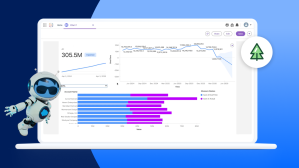How do we ensure women are empowered to use, benefit and shape the third wave of AI: agentic AI? That was the topic of discussion at a recent roundtable at Salesforce Tower Sydney, hosted in partnership with Women’s Agenda.
Salesforce’s Rowena Westphalen, SVP of Innovation, AI and Customer Advisory, and Renata Bertram, VP, Field Marketing, ANZ, were joined by influential leaders from various industries, backgrounds, and companies, including Amazon Web Services, WPP, Commonwealth Bank, Telstra, Macquarie Group and Bluescope, to discuss the importance of gender equity in the era of agentic AI.
Recent Salesforce research revealed female C-suite executives in Australia were embracing AI at high rates, with 50% saying they used generative AI “all the time” – compared to just 38% of their male counterparts. The study also showed they’re more likely to recognise the technology as a top priority, critical to the success of their business over the next three years – 48% versus 36% of male executives.
The opportunity is clear: AI can be a powerful tool to accelerate careers, improve productivity, and enhance creativity and innovation.“AI’s importance cannot be overstated. Agentic AI technologies are more accessible and advanced than ever, offering every organisation the chance to transform how they work,” said Rowena Westphalen. “As we move from AI experimentation to true business transformation, we must ensure women have strong representation in AI’s development and implementation.”
Why participation in AI matters
The generative AI revolution of the past couple of years has evolved into the agentic AI era – whereby businesses are changing how they operate and creating meaningful impact across communities with the support of AI agents. AI is already transforming industries, from public sector to retail, and there’s a unique opportunity for women to shape how this technology continues to evolve. AI reflects the data it learns from. When women and other underrepresented audiences engage with AI, they bring fresh perspectives, challenge biases and help create technology that is ethical and serves everyone.
Building AI confidence
It’s clear that women see the value of AI and are integrating it into their work. However, the study suggests a confidence gap exists between women and men when assessing their AI skills. Despite showing higher adoption rates, only 37% of female executives rate themselves as “highly proficient” in AI versus 54% of male executives.
The roundtable discussion highlighted several possible reasons for this:
- AI doesn’t feel like “real” work: Some women worry that using AI is cheating or cutting corners, especially in male-dominated industries. There’s also hesitation in claiming work that has been AI-generated or AI-supported as their own.
- Fear of mistakes: AI isn’t perfect. Many women feel uncertain about trusting AI-generated results, particularly in high-stakes fields like law and finance, leading them to avoid using it for critical tasks rather than refining it for more accurate outcomes.
- Perception of complexity: Some women have the wrong perception of AI being highly technical, leading women to believe that unlocking its full potential requires advanced tech skills. This can create hesitation to further explore the adoption, limiting opportunities to integrate AI more effectively into their work.
Ensuring this new phase of AI is inclusive and accessible
The roundtable discussion made one thing clear: women need to continue to embrace AI – not just at work, but in everyday life.
As part of this, participants shared views on the need to shift the narrative. AI isn’t about doing less. It’s about doing better. It’s a tool, like many others, designed to enhance work, not replace expertise. There’s also a critical need for clear pathways that support women and other underrepresented groups in this new agentic AI era, including training and development programs to build confidence.
Here are a few ideas for how to make AI more inclusive and accessible:
1. Reframe AI as an extension to your team, not a shortcut: Move beyond the idea that using AI is “cheating”. When used correctly, AI and autonomous agents in particular can free up time for more meaningful work, with greater focus on creativity and innovation.
2. Highlight clear examples and role models: Having a clear view of how others are using and benefiting from AI can encourage and inspire women to engage more meaningfully.That could include workshops and playbooks that help visualise the opportunities andhow to shape their use of the technology to deliver better outcomes.
3. Create more training and development opportunities: Businesses should invest in accessible and engaging training programs to support equal advancement, including coaching, mentoring, peer learning, networking, sponsorship, and leadership opportunities. This would help women understand how to integrate AI into their daily work, and provide support for women who are outside the workforce, such as those on parental leave, to avoid gaps when they return.
“To empower women in the age of AI, hands-on experiences are essential. When you look at your workforce, they know where the issues and inefficiencies are, and where they can become more productive. I’ve seen firsthand with my team how running workshops and discussions on how AI can improve our processes help demystify and enhance understanding of the technology, its risks and benefits. This is a simple but powerful tool to encourage a mindset of confidently using AI to achieve the best outcomes,” said Renata Bertram.
The success of AI depends on continuous learning and collaboration, and women already play a crucial role in this evolution. They’re leading, innovating and advocating for more inclusive policies – and it’s essential we collectively continue to expand this impact.
Expanding access to AI skills and careers is a priority. One of the ways Salesforce is helping pave the way for the future of work is through Trailhead, its free online learning platform. Trailhead can guide individuals with limited technical knowledge into Salesforce roles and has expanded its content to include AI-specific skills training.
Salesforce’s commitment to address training and AI-skilling is an imperative. This commitment ignites the company to deliver for customers, partners and communities, and move closer to equality for all.
By increasing the diversity of those engaging with AI, we can more easily identify and address biases, ensuring that AI becomes a tool that benefits everyone.
Learn more:
- Read the Building an AI-Powered Business in 2025: Six Key Questions for Executives whitepaper
- Listen to the Salesforce x Women’s Agenda podcast series here
- Learn more about Agentforce















